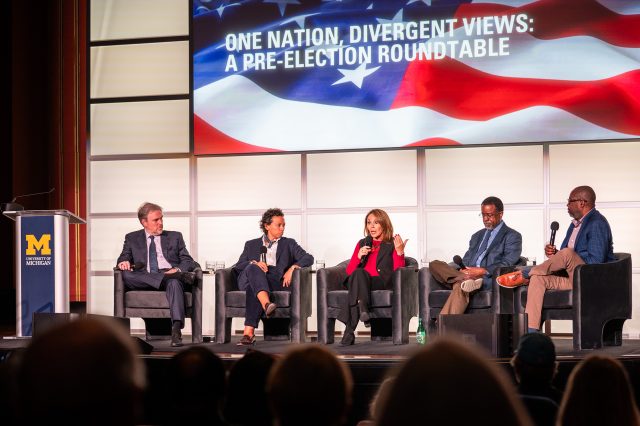[ad_1]
More than 200 University of Michigan students and community members gathered in the Rackham Auditorium Wednesday night to hear nationally renowned journalists and experts discuss the upcoming general election. The conversation, hosted by the Wallace House Center for Journalists, touched on political realignment, polarization, immigration and misinformation. The event was titled “One Nation, Divergent Views: A Pre-Election Roundtable” and moderated by Detroit-based public radio journalist Stephen Henderson.
The panel’s speakers included Lydia Polgreen, New York Times opinion columnist, María Elena Salinas, ABC news contributor and broadcast journalist, opinion columnist Bret Stephens and Vincent Hutchings, Hanes Walton, Jr. collegiate professor of political science and Afroamerican and African studies. The speakers first considered questions from Henderson and later opened the floor to questions from the audience.
Throughout the panel, speakers considered whether party structures are changing and, in turn, whether these potential shifts make the outcome of the upcoming election more difficult to predict. Stephens said he believed shifting party demographics make election forecasting more difficult.
“It used to be a case that working class voters voted Democrat,” Stephens said. “That has shifted, in part, because the identities of the parties have shifted along with the correlation between levels of education and party affiliation. So what appears to be this kind of 50-50, country, actually masks, I think, a lot of movement that’s very difficult to predict.”
Salinas similarly suggested that in her personal reporting experience, she has noticed movement within the Latine community between different political parties. Vice President Kamala Harris is currently polling lower among the Latine community than the Democratic nominees in the last six elections.
“Most Latino women are supporting Kamala Harris, but it’s Latino men, particularly young Latino men, that, like… non-college educated men, they are going towards Trump,” Salinas said.
Hutchings addressed these observations with skepticism and said that, as a political scientist, he believes it is important to exercise caution when identifying trends in voting behavior.
“There may well be shifts, and those shifts may be sufficiently consequential to decide the outcome,” Hutchings said. “But the notion that there will be dramatic changes, that some group of voters are moving towards one party or another — it’s way too soon to know that.”
Speakers also considered what kinds of qualities in candidates are most effective in encouraging people to vote. Stephens suggested that some voters might be drawn to former President Trump due to the perception that his presidency will create a sense of stability in their lives.
“Their instinct is to go to the candidate who seems to be — although I see (him) as a chaos agent — the heavy-handed guy who gets things in order,” Stephens said.
Polgreen said she believes when trying to predict voter behavior, it is important to remember that people do not always behave or vote rationally.
“People aren’t making decisions based on an empirical study of facts or history,” Polgreen said. “We’ve published so many focus groups and things of people who (say) ‘When Trump was president our car payment was less’ … but there’s a lot of other stuff that goes into it that is extremely salient to the state of the world.”
LSA senior Maurielle Courtois, is the co-president of Turn Up Turnout, a nonpartisan U-M student organization promoting voter engagement. Courtois attended the event and said she enjoyed learning more about how the panelists understood the election in the context of their voting experience.
“I have such a Gen Z perspective of elections and voting, like it’s my first time voting in a presidential election,” Courtois said. “Everyone on that panel has had a multitude of opportunities to vote … so their perspective is, I would say, different, because they have other elections to compare this one to. This is the only one that I have experienced voting in.”
Daily Staff Reporter Amanda Venclovaite-Pirani can be reached at amandavp@umich.edu.
Related articles
[ad_2]
Source link











